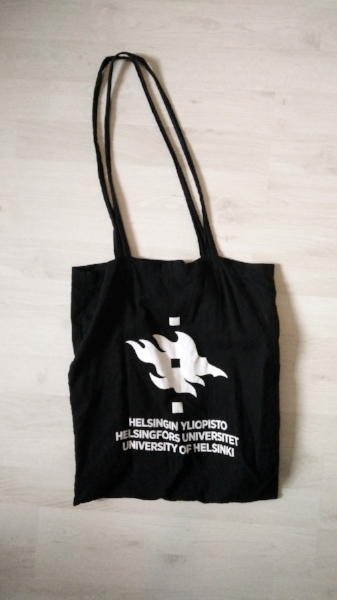The Culture of Reserved Pride
It is a long, long tradition in Finnish culture that it is not socially acceptable to be too proud of one’s achievements, at least not publicly. The norm is that one should humbly admit that they have reached a certain goal and modestly thank everyone who congratulates them, even if inside their head, excitement and contentment were boiling up to a point where the joy just wants to come out. I wonder, however, which kind of pride is stronger – the one where you shout from the rooftops that you have been accepted to study in your first-choice school, or the one where you keep your straight A’s to yourself and go to sleep feeling happy and good about yourself. Does one need other people’s congratulations and admiration to be proud of whatever it is that they have achieved? Is the Finnish tradition wrong, or right?
I began to wonder my culture’s take on being proud whilst walking down the streets of Helsinki and spotting a couple of University of Helsinki cotton bags. I have had one myself for the summer and have received somewhat negative feedback from my peers – even if it was masked under jokes, I have got the hint that it does not exactly boost my street credibility when I wear this bag that states where I go to school. The reason why the jokes have not affected me is the same reason for which I bought the said accessory in the first place: I felt allowed to be overtly proud of the fact that I study at the University of Helsinki and that I support the university itself, as well as Finnish education in general. After all, I had worked hard for the three years I went to high school, and studied well for my entrance exam, too – therefore, it was my doing that had put me into this position of being able to study in a well-ranked school. Why is it then considered ‘not cool’ to show it by carrying one’s study devices or groceries in a handy bag that merely has the logo of a university on it?
One of the reasons might be that many Finns do not always feel comfortable with showing such strong emotions as being proud. It is indeed in our blood to act like a true Finn: to dislike small talk, to appreciate silence and personal space, to be persistent – or to have sisu, to be reserved and private, to be humble and not to talk big or show off. Or is it? These are all rough stereotypes, even if well-known ones, and it is of course not the truth about a large portion of the inhabitants of our northern republic. Can stereotypes expire? Could the age-old Finnish perception of good manners and virtues meaning to act in a very private and humble way be outdated?
Now, I do not mean to claim that our culture is somehow behind other countries in that we do not go out of our way to prove our worth by telling others about how we have worked for a goal and succeeded in it. I am not either trying to force stereotypes onto a timeline where the older ones have an “expired” stamp on them and the newer ones are marked with a lovely green symbol of acceptance. A tradition does not have to equal nonmodern and inapplicable behaviour – but even traditions can sometimes benefit from changing in some ways along the years.
The typical Finnish characteristics described above may be but a generalization. However, all stereotypes have unarguably originated from truthful observations. We all know that culture differences do not mean differences in value; but on the other hand, could it be that, sometimes, one country has a culture that is, in some way, wiser than that of another one?
For example, there is a stereotype about North Americans: Their social norm has always seemed to be acting very confident and not having any issues with public pride. They openly express their feelings, such as love for their loved ones – while in Finland, even our language avoids big words like love; the only equivalent for this term is läheiset, along the lines of “the people with whom one is close”. This stereotyped American behaviour of positivity might seem wholesome. However, it does have a great downside in that pride showed on the surface does not necessarily mean pride felt authentically and deeply. Hence, it just might be that the Finnish sense of private pride is surprisingly wise: If we feel something as genuinely as it is possible, we do not need to tell everyone about it. It suffices that we ourselves know that the emotion is real and feel its positive consequences in ourselves. Evidently, pride and joy can be something that motivates us to keep working for further goals, that boosts our self-confidence, or that warms us up starting from inside as we go to sleep in the evening, going through the events of the day – something that, ultimately, will make us feel content in our skin. We do not necessarily always have someone else around to create that effect. Thus, quiet pride can be an immensely healthy phenomenon: it is an ingredient that is needed for self-sufficiency, which, in turn, is needed for stability and motivation that comes from inside, and not from outside in the form of pressure to accomplish something.
So, Finns just might be onto something with said culture of silent joying. However, if we want to look at stereotyped cultural phenomena as generalizations (or parts of the truth) that develop and change over the generations, this healthy behaviour would then probably be evolving in some way or another. Social media is definitely one big factor in cultural norms changing. Before Facebook, people did not share with hundreds of their acquaintances that they had got a promotion or been accepted into a prestigious university. When Facebook was at its most popular, an average user might have seen tens of posts a day about various achievements of their friends or even strangers. The constant feed of either constructive positivity or, sometimes, showing off, may easily create jealousy and pressure to endlessly succeed better, to achieve higher and higher goals. Thus, an overly open perspective to sharing pride might not always have as beneficial results as a more modest approach.
People compare themselves and their accomplishments to others all the time; that is just a part of human nature. They might even feel a touch of jealousy when seeing someone wearing merchandise of a renowned university. This habit of comparing and bottling up envy may sometimes be reinforced by social media, but in the end, it has always existed. Languages offer unarguable proof: even the word ‘pride’ has different meanings from positive contentment to unpleasant arrogance. Pride is not always beneficial and relevant in its true nature – however, after all the hard work we go through when, for instance, trying to get into a good school, why would it be so socially unacceptable to show that we are proud of what we have achieved? Telling someone about a goal you have reached is hardly showing off if done in all decency; it is far from bragging about something that, say, you did not even need to make efforts in order to obtain.
Therefore, one could claim that even Finns could benefit from showing positive attitude and sane amounts of pride from time to time, because fighting for a personal goal such as getting a job or being accepted into a school deserves to be noticed and rewarded. If a congratulation creates that comforting warmth in a freshman’s heart as they go to sleep, going through the events of the day – then maybe it is worth telling someone about the reason that they feel proud.
However, the problem with our culture is that the only way a great number of Finns are able to express their positive feelings is to do it sarcastically. I might say to a friend who makes fun of my university bag that “Oh, I’m only wearing it ironically.” And in reality, I use it because I am proud, and I feel that it is completely respectable to feel that way. I cannot help but wonder whether the slight embarrassment that being proud of myself, my school and my country still causes me to bare has more to do with my own insecurities than with my culture’s norms – and whether many more people might feel something similar. Therefore, I would like to see open expression of one’s positive feelings and the act of quite simply enjoying the effects of sharing pride, as a goal that anyone might want to consider taking on. Productive satisfaction in one’s accomplishments can hardly be seen as a regrettable sin, not even in the stereotyped traditional Finnish mindset.
Thus, specifically to all freshmen who have begun their journey this autumn, I would like to say that you have earned the pride you probably and rightfully feel for getting accepted to study; and that maybe you could and even should express your joy and excitement; and that maybe opening up about positive feelings is not frowned upon anymore, or not always, or not ever – in case you do not frown upon it yourself.








